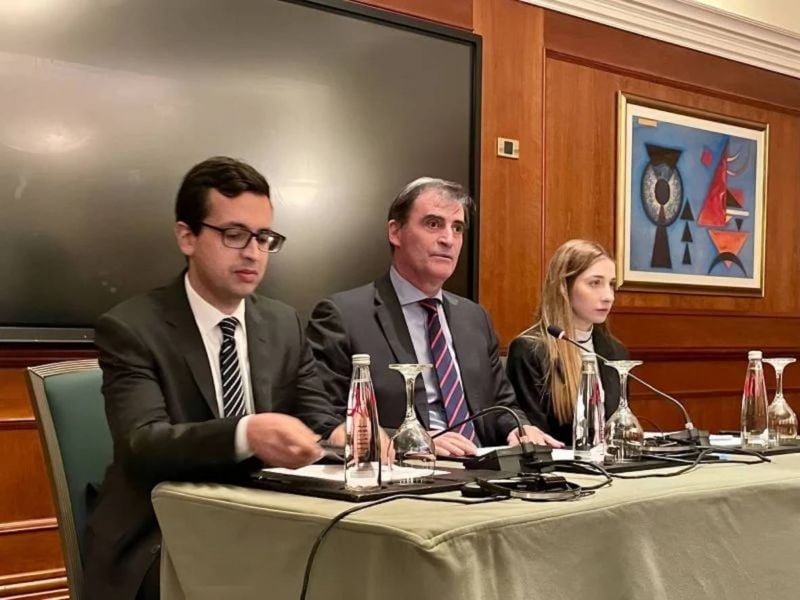
The head of the IMF mission for Lebanon, left, during his visit to Beirut last March. (Credit: Philippe Hage Boutros)
The International Monetary Fund (IMF) delegation has continued the marathon talks it started Monday with various institutions in Lebanon. A two-and-a-half-hour meeting with the chairmen of the Finance and Budget committee and Administration and Justice committee, and a slightly shorter meeting with economic bodies (employers) were held Wednesday.
The head of the IMF mission for Lebanon, Ernesto Ramirez Rigo, made no statement at the end of these two meetings, but it seems the status quo was maintained, with MPs and business leaders still trying to convince the IMF to soften its stance on some points, on which IMF has reiterated it will make no concessions.
Sources within the concerned committees and employers have told L’Orient Today the delegation is expected to issue a statement by the time it leaves the country on Friday. IMF representative in Lebanon refused to respond to our request for comment. The delegation has already met caretaker Prime Minister Najib Mikati, Parliament Speaker Nabih Berri, caretaker Finance Minister Youssef Khalil and acting Governor of the Banque du Liban (BDL) Wassim Manssouri.
"We want to restore Lebanon’s financial credibility"
The main hurdle, erected in various forms since Lebanon requested aid from the IMF in 2020, remains the distribution of financial losses accumulated in the country, totaling more than $70 billion, according to IMF-validated estimates.
The IMF is demanding that this process involve “acknowledging and addressing upfront the large losses incurred by the central bank and commercial banks, respecting the hierarchy of claims, protecting small depositors, and limiting the recourse to the public sector,” said Rigo when he visited Lebanon in March.
The visit was to update the IMF assessment of the country’s situation in accordance with the procedure set out in Article IV of its Articles of Agreement, to which Lebanon is a signatory.
The solution the IMF has recommended involves asking large depositors to give up part of the remaining c.$97 billion present in the system before October 2019 - of which more than 90 percent is denominated in bank dollars (aka lollars). They were targeted by the banking restrictions imposed without being covered by a capital control law.
However, Lebanese Forces MP Georges Adwan, chairman of Parliament’s Administration and Justice committee, and Free Patriotic Movement MP Ibrahim Kanaan, chairman of the parliamentary Finance and Budget committee, both rejected this idea and estimated that these deposits could not be considered as losses. For them, these are state, BDL and commercial banks’ commitments to Lebanese depositors.
“The [staff-level] agreement signed in April 2022 with the IMF required a kine be drawn between the past and the present [in terms of bank deposits]. This is what we do not accept and our approach is based on the idea of identifying responsibilities, repaying debts and repaying losses,” said Adwan.
Kanaan spoke of “frank” discussions before adding, “We want to reach an agreement with the IMF and restore Lebanon’s financial credibility...but this cannot be done by wiping out everything.”
Kanaan also criticized cabinet for wrongly blaming Parliament for the delay in adopting several reform projects, a bone of contention that was the subject of a recent blame game between Kanaan and Deputy Prime Minister Saadeh Chami.
‘Nothing new’ for employers
Economic bodies, chaired by businessman and former minister Mohamed Choucair, published a press release after the meeting held at the Beirut Chamber of Commerce, Industry and Agriculture, praising the cooperation with the IMF, before calling for the adoption of a “fair and reliable financial recovery plan that preserves property and deposits.”
Speaking to L’Orient-Le Jour, one of the member's of the economic bodies, who declined to be named, admitted that the discussions were going “nowhere” and that there was “nothing new to add” since the delegation’s last visit.
“What is important for the employers’ association is that the IMF does not force Lebanon to adopt measures that will nip in the bud the beginnings of the recovery that we have seen this year,” he added, referring to 2023’s relatively good tourism season.
He says the economic bodies particularly oppose the adoption of the draft law introducing capital controls in its current form. The draft has been languishing in Parliament since the start of the year.
For the IMF the equation is simple: Lebanon must launch the reforms set out in the staff-level agreement signed in April 2022 to put its finances in order, restructure its banks and revive its economy.
The longer the leaders procrastinate and delay the actual launch of these reforms, the less money will be left to return to depositors.
In its final assessment for Lebanon published in June, the IMF estimated that cabinet’s failure to restructure the country’s financial sector between March 2020 and January 2023 had caused Lebanese depositors to lose a further $10 billion.
This story first ran in French in L’Orient-Le Jour, translated by Joelle Khoury.